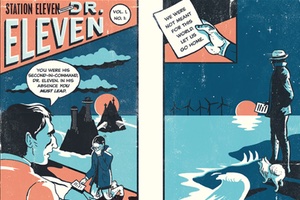Since its publication in 2014, Canadian author Emily St John Mandel’s Station Eleven has attracted enthusiastic critical responses. This post-apocalyptic novel won an Arthur C. Clarke Award for Science Fiction in 2015 and was shortlisted for many other awards, including the National Book Award, the PEN/Faulkner Award, and the Bailey’s Women’s Prize for Fiction. In this OLH Special Collection, we seek to explore Station Eleven's position within twenty-first-century writing.
Station Eleven intersects with various debates in contemporary literary studies, opening up questions about genre, politics, national literary traditions, literary form and intermediality, popular culture and prize culture. The novel partakes in what James Berger describes as the “pervasive post-apocalyptic sensibility in recent American culture”. This sensibility is no longer the sole province of science fiction, as canonical literary authors like Cormac McCarthy and Jim Crace have written novels imagining post-catastrophic futures. Indeed Veronica Hollinger speaks of the “'disappearance’ of science fiction as a separate generic enterprise” in the contemporary and Mandel herself, Arthur C. Clarke Award for Science Fiction notwithstanding, identifies her novel as literary fiction rather than science fiction. How might Station Eleven help us to frame issues of genre in twenty-first-century writing, in particular the debate between “literary fiction” and “genre fiction”, and how are these issues entangled with the production of cultural capital through literary prizes? Biblical apocalyptic narratives, as Lois Parkinson Zamora underlines, “developed in response to political and moral crises”. To what do we owe the contemporary surge of post-apocalyptic narratives and is Station Eleven radical or conservative in the way it imagines a hopeful future after global capitalism?Station Eleven and Twenty-First Century Writing
Critical Temporalities: Station Eleven and the Contemporary Post-Apocalyptic Novel
Diletta De Cristofaro
2018-11-23 Volume 4 • Issue 2 • 2018 • 37
Also a part of:
Special Collection: Station Eleven and Twenty-First-Century Writing
The Rise of the Comics Künstlerroman, or, the Limits of Comics Acceptance: The Depiction of Comics Creators in the Work of Michael Chabon and Emily St. John Mandel
Daniel King
2018-12-28 Volume 4 • Issue 2 • 2018 • 43
Also a part of:
Special Collection: Station Eleven and Twenty-First-Century Writing
Special Collections
-
Cultural Heritage Data for Research: Opening Museum Collections, Project Data and Digital Images for Research, Query and Discovery
Caliban's Mirror: Reflections of James Joyce and Oscar Wilde
Cultural Representations of Machine Vision
The Public Curatorship of the Medieval Past
Medieval Minds and Matter
Representing the Medieval in Popular Culture: Remembering the Angevins
The Politics and History of Menstruation: Contextualising the Scottish Campaign to End Period Poverty
Production Archives 03: Archival Practices
Production Archives 02: Production Contexts
Production Archives 01: Puppets for Action
Representing Classical Music in the Twenty-First Century
The Pathological Body: European Literary and Cultural Perspectives in the Age of Modern Medicine
Binary Modernisms: Re/Appropriations of Modernist Art in the Digital Age
Local and Universal in Irish Literature and Culture
Reading in Ruins: Exploring Posthumanist Narrative Studies
The Language of Perspective
Nancy Astor, Public Women and Gendered Political Culture in Interwar Britain
The Working-Class Avant-Garde
Colonialities in Dispute: Discourses on Colonialism and Race in the Spanish State
Powering the Future: Energy Resources in Science Fiction and Fantasy
Writers and Intellectuals on Britain and Europe, 1918–2018
Literature, Law and Psychoanalysis
Muslims in the Media
Encounters between Asian and Western Art in the 20th and 21st centuries: a liberating influence for Asia?
Waste: Disposability, Decay, and Depletion
Pride Revisited: Cinema, Activism and Re-Activation
New Approaches to Late Medieval Court Records
Utopian Art and Literature from Modern India
Right-Wing Populism and Mediated Activism: Creative Responses and Counter-Narratives
Representing Climate: Local to Global
Cultivating Spheres: Agriculture, Technical Communication, and the Publics
Freedom After Neoliberalism
The Medieval Brain
Remaking Collections
New Approaches to Medieval Water Studies
Imaginaries of the Future 01: Bodies and Media
Imaginaries of the Future 02: Politics, Poetics, Place
Imaginaries of the Future 03: Utopia at the Border
Postcolonial Perspectives in Game Studies
Station Eleven and Twenty-First-Century Writing
#Agreement20
What’s Left? Marxism, Literature and Culture in the 21st Century
New Voices in Jewish-American Literature
Authors, Narratives, and Audiences in Medieval Saints’ Lives
From TV To Film
American Literature & the Transnational Marketplace
Mnemosyne
Healing Gods, Heroes and Rituals in the Graeco-Roman World
The Abolition of the University
